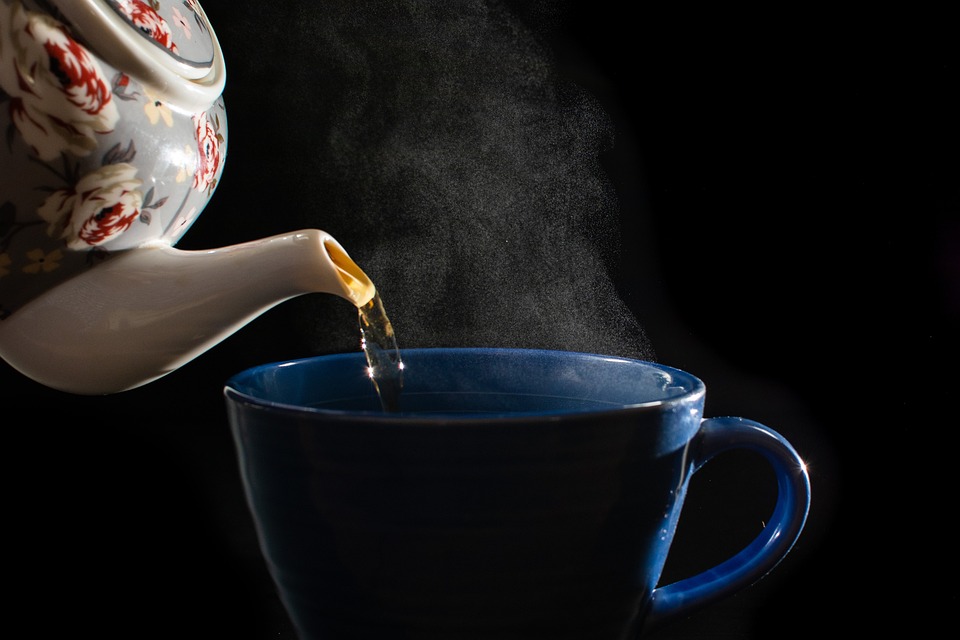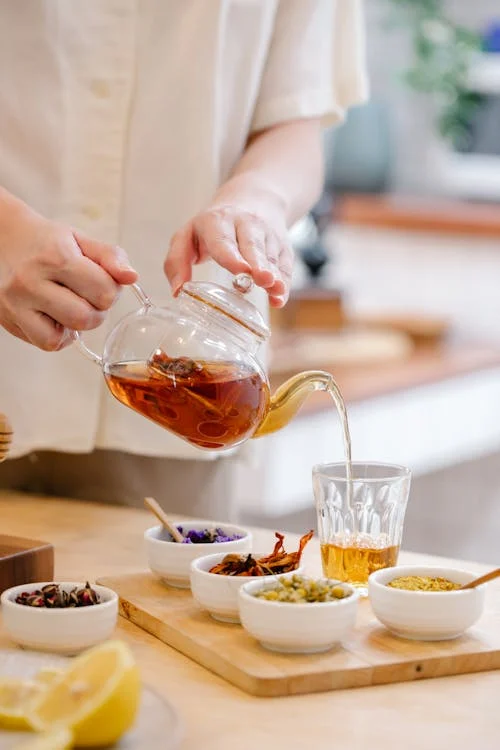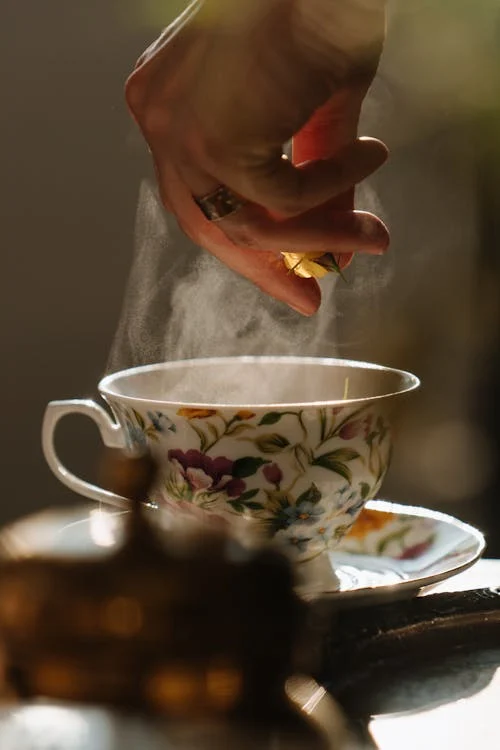
Drink a warm cup of herbal tea, and it can feel like a hug in a mug, offering comfort while supporting your well-being. Whether life has you frazzled or your stomach's churning, herbal teas step in as a gentle, comforting ally, supplying what you need to feel better.
From Paris to Tokyo, the popularity of caffeine-free beverages speaks for itself — they're simply irresistible. So, what's the magic behind herbal loose-leaf teas ? Dive into the rich stories, diverse varieties, and remarkable benefits that have made tea a beloved tradition around the world.
What is Herbal Tea?
Herbal tea isn’t technically “tea.” True tea, like green tea or black tea, comes from the tea plant Camellia sinensis. Herbal tea is made by steeping dried fruits, flowers, herbs, and spices in hot water. This caffeine-free alternative to authentic tea is packed with flavor and offers various health benefits.
Are you seeking a gentle lift or a calming refuge? Whichever you want, the delightful world of herbal beverages has you covered, providing respite from common complaints and fostering a sense of wellness. From chamomile tea for relaxation to ginger tea for digestive issues, there’s a blend for almost every need.
What’s the Origin of Herbal Tea?
Herbal tea has roots that stretch across centuries and continents. At the same time, authentic tea originated in East Asia. Herbal teas do not come from a tea plant; rather, they evolved separately as infusions of herbs, flowers, fruits, and spices. These beverages have been used for medicinal purposes and daily rituals across cultures, with blends tailored to local plants and traditions.
But why is "tea" in the name if no tea leaves are involved? The term "herbal tea" likely arose from the practice of steeping ingredients in hot water, much like true tea. Over time, "tea" became synonymous with any infused beverage, even those without the Camellia sinensis plant.
Herbal tea, also called "tisane," essentially parallels traditional tea, offering the ritual and warmth of a brewed drink while showcasing different ingredients. Whether it’s grandma’s familiar brew or a scientist’s latest concoction, herbal tea blends meld yesterday’s wisdom with today’s know-how.
Types of Herbal Tea
There’s no shortage of herbal options to explore. Each type offers unique flavors and potential health benefits. So, what are the top picks that everyone's talking about? Nelson's Tea has compiled the list below so you can learn about each option.
Chamomile Tea
Chamomile tea is known for its calming properties. Prepare to unwind with a calming cup of chamomile tea crafted from the dried flowers of the chamomile plant. If you're looking for a natural way to melt away tension and find your inner calm, look no further than chamomile tea, where the delicate flavor and calming properties work together in perfect harmony.
Peppermint Tea
What do you reach for when a busy day leaves you with a knotted stomach and a pounding headache? For many, the answer is peppermint tea, a timeless comfort drink that promptly sets to work soothing both and promoting smoother digestion. Hand-in-hand with history, peppermint oil has walked the path of a natural remedy, squeezed from the leaves of a centuries-old healer. This tea's refreshing, caffeine-free taste is undeniable.
Rooibos Tea
Rooibos tea, also known as red bush tea, is a South African favorite. What's not to love about a tea that's as gentle as it is powerful? This herbal blend is antioxidant-rich, which translates to a stronger immune system and healthier heart — all minus the caffeine. With blood pressure and cholesterol levels on the rise, it's encouraging to know that loose-leaf rooibos tea may offer a natural solution to both problems.
Hibiscus Tea
Dry hibiscus flowers are the secret to hibiscus tea, bursting with flavor and packing a tangy punch. With its natural anti-inflammatory powers, hibiscus tea is serving up a pretty impressive health trifecta: bring down that blood pressure and get those cholesterol levels in check!

Ginger Tea
A go-to for upset stomachs, ginger tea is made from the root of the ginger plant. It contains gingerol, a compound with anti-inflammatory and antioxidant effects. Ginger tea can help reduce nausea, ease symptoms of colds, and even promote circulation.
Rose Hip Tea
Rose hip tea is derived from the seed pods of roses. Packed with vitamin C and antioxidants, it may boost the immune system and ease arthritis symptoms. Its tart yet pleasant flavor makes it a favorite among herbal tea enthusiasts.
Turmeric Tea
Steeped in ancient tradition, turmeric tea has earned its reputation as a potent potion, hailed for its dual role as an inflammation fighter and antioxidant powerhouse. It's a centuries-old remedy that's been shown to reduce inflammation and lubricate stiff joints.
Lemon Balm Tea
This herbal tea is known for its soothing effects. Lemon balm tea may help reduce anxiety, improve sleep, and even support memory. However, it’s best enjoyed in moderation, as too much could upset your stomach.
Echinacea Tea
Echinacea tea is often associated with immune system support. While research is mixed, many people drink it to help fight colds and ease flu symptoms. It’s made from the flowers and leaves of the echinacea plant.
Passionflower Tea
Passionflower tea is a lesser-known option but is beloved for its calming properties. It’s thought to help with anxiety and improve sleep. Be cautious if you’re taking medications, as passionflower can interact with certain drugs.

Benefits of Herbal Tea
Imagine sipping a warm, aromatic brew that not only calms inflamed joints but also sends your immune system into high gear. That's exactly what herbal teas can do for you. Minor troubles like an upset tummy or jangled nerves can be soothed with these handy remedies. Meanwhile, hibiscus and chamomile teas can help keep your heart happy and keep your blood pressure in check.
Drinking tea can be an excellent way to incorporate natural remedies into your routine. While not a replacement for medical treatment, herbal teas are an enjoyable and evidence-based complementary option for better health.
How Do You Make Herbal Tea?
Making herbal tea is simple and rewarding, but the process can vary based on the type of tea you’re brewing. Start with high-quality loose-leaf herbal teas, like those offered by Nelson’s Tea, and use tea accessories such as infusers or strainers for ease.
The steeping time, water temperature, and amount of tea can differ depending on the blend. For the best results, always follow the brewing instructions provided with your tea. This ensures you get the optimal flavor and benefit from the herbs.
What Does Herbal Tea Taste Like?
Depending on the blend of herbs, flowers, and spices, herbal teas burst with distinct flavors. Chamomile tea has a mild, floral taste, while ginger tea is bold and spicy. Hibiscus tea offers a tart, cranberry-like flavor; peppermint tea is refreshingly cool.
How Much Caffeine is in Herbal Tea?
Herbal teas come in various flavors, depending on the herbs, flowers, and spices used. Chamomile tea has a mild, floral taste, while ginger tea is bold and spicy. Hibiscus tea offers a tart, cranberry-like flavor; peppermint tea is refreshingly cool.
Sip Into Something Special
Herbal teas offer more than just a tasty drink — they provide health-promoting properties, relaxation, and variety. Whether you’re looking to relieve symptoms, boost your immune system, or simply enjoy a caffeine-free beverage, Nelson’s Tea has you covered.
Shop now at Nelson’s Tea for loose-leaf teas, tea accessories, and more. Find your perfect blend today and start sipping your way to better health!
These statements have not been evaluated by the Food and Drug Administration. This product is not intended to diagnose, treat, cure, or prevent any disease.

